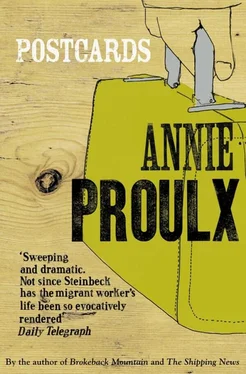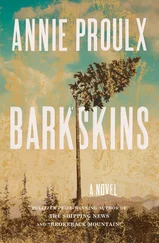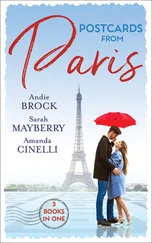ANNIE PROULX
Postcards

Fourth Estate
An imprint of HarperCollins Publishers 1 London Bridge Street London SE1 9GF
www.harpercollins.co.uk
First published in paperback in 1994 by Fourth Estate and by
Harper Perennial in 2006, reprinted 7 times.
First published in Great Britain in 1993 by Fourth Estate
Copyright © Dead Line, Ltd. 1992
Annie Proulx asserts the moral right to be identified as the author of this work
A catalogue record for this book is available from the British Library
This novel is entirely a work of fiction. The names, characters and incidents portrayed in it are the work of the author’s imagination. Any resemblance to actual persons, living or dead, events or localities is entirely coincidental.
All rights reserved under International and Pan-American Copyright Conventions. By payment of the required fees, you have been granted the non-exclusive, non-transferable right to access and read the text of this ebook on-screen. No part of this text may be reproduced, transmitted, down-loaded, decompiled, reverse engineered, or stored in or introduced into any information storage and retrieval system, in any form or by any means, whether electronic or mechanical, now known or hereinafter invented, without the express written permission of HarperCollins ebooks.
HarperCollins Publishers has made every reasonable effort to ensure that any picture content and written content in this ebook has been included or removed in accordance with the contractual and technological constraints in operation at the time of publication.
Source ISBN: 9781841155012
Ebook Edition © JUNE 2012 ISBN: 9780007385553
Version: 2018-05-23
‘Annie Proulx has come close to writing “The Great American Novel”’
New York Times
‘Postcards feels like a fifth or sixth novel, not a first. Language that sizzles like meat in a pan … A wonderful writer and an astonishingly accomplished novel’
Chicago Tribune
‘Her first novel fulfils the promise of her short stories … hugely ambitious … The natural description is superb. The dialogue has a raspy bony twang to it. She pushes language to breaking point … a gifted prose stylist who renders her characters on the page to mesmerizing effect’
San Francisco Chronicle
‘The author’s literary ancestors range from Edith Wharton to Nathaniel West. But Proulx sees the grand side too … She sees every part of the national configuration and wraps every character here in a crazy-quilt of literary affection’
Los Angeles Times
‘Postcards triumphantly delivers. You could use the word “great” about Postcards without embarassing yourself’
Boston Globe
‘Rich, boisterous, remarkable … Annie Proulx draws characters who matter’
Washington Times
For Roberta
Cover
Title Page
Copyright
Praise for Postcards
Preface
I
1 Blood
2 Mink’s Revenge
3 Down the Road
4 What I See
5 A Short, Sharp Shock
6 The Violet Shoe in the Ditch
7 When Your Hand Is Cut Off
8 The Bat in the Wet Grass
9 What I See
10 The Lost Baby
11 Tickweed
12 Billy
13 What I See
II
14 Down in the Mary Mugg
15 The Indian’s Book
16 The Bigger They Are the Higher They Burn
17 The Weeping Water Farm Insurance Office
18 What I See
19 The Lonely Hearts Prisoner
20 The Bottle-Shaped Tombstone
21 The Drive
22 The Dermatologist in the Wild Wood
23 Ott’s Lots
24 The Indian’s Book Again
III
25 Garden of Eden
26 Bullet Wulff
27 Crazy Eyes
28 The Kernel of life
29 Dazed and Confused
30 The Troubles of Celestial Bodies
31 Toot Nipple
32 Pala
33 Obregón’s Arm
34 Tumbleweed
35 What I See
36 Shotguns
37 The Indian’s Book
38 Looks Like Rain
39 The Logging Road
IV
40 The Gallbladders of Black Bears
41 The Tropical Garden
42 What I See
43 The Skeleton with Its Dress Pulled Up
44 The Runty Rider Curses Judges
45 The Lone One
46 What I See
47 The Red-Haired Coyote
V
48 The Hat Man
49 What I See
50 The One Only One
51 The Red-Shirt Coyote
52 La Violencia
53 The Fulgurite Shaped Like a Bone
54 What I See
55 The White Spider
56 The Face in the Moss
57 The Jet Trail in the Windshield
58 What I See
Acknowledgments
Also By Annie Proulx
About the Publisher
‘But that’s the part of it I always liked. He adjusted himself to beams falling, and then no more of them fell, and he adjusted himself to them not falling.’
DASHIELL HAMMETT, The Maltese Falcon
I
EVEN BEFORE HE GOT UP he knew he was on his way. Even in the midst of the involuntary orgasmic jerking he knew. Knew she was dead, knew he was on his way. Even standing there on shaking legs, trying to push the copper buttons through the stiff buttonholes he knew that everything he had done or thought in his life had to be started over again. Even if he got away.
He couldn’t get any air, but stood on his knocked-out legs gasping and wheezing. It was like he’d taken a bad fall. Dazed. He could feel the blood hammering in his throat. But there was nothing else, only the gasping for breath and an abnormal acuity of vision. Mats of juniper flowed across the field like spilled water; doghair maple crowded the stone wall wavering through the trees.
He’d thought of the wall walking up the slope behind Billy, thought of it in a common way, of working on it sometime, setting back in place the stones that frost and thrusting roots had thrown out. Now he saw it as a scene drawn in powerful ink lines, the rock fissured with crumpled strings of quartz, humps of moss like shoulders shrugging out of the mold, black lignum beneath rotten bark, the aluminum sheen of deadwood.
A stone the size and shape of a car’s backseat jutted out of the wall, and below it was a knob of soil that marked the entrance to an abandoned fox den. Oh Jesus, it wasn’t his fault but they’d say it was. He grasped Billy’s ankles and dragged her to the wall. He rolled her up under the stone, could not look at her face. There was already a waxiness to her body. The texture of her bunched stockings, the shape of her nails glowed with the luminous hardness that marks the newly dead in the moment before the flames consume or the sucking water pulls them under. The space beneath the rock was shallow. Her arm fell outward, the hand relaxed, the fingers curled as if she held a hand mirror or a Fourth of July flag.
Instinctively he translated the withering shock into work, his answer to what he did not want to understand, to persistent toothache, hard weather, the sense of loneliness. He rebuilt the wall over her, fitting the stones, copying the careless, tumbled fall of rock. A secretive reflex worked in him. When she was locked away in the wall he threw on dead leaves, tree limbs and brush, raked the drag marks and scuffed ground with a branch.
Down the back fields, keeping to the fence line, but sometimes staggering onto open ground. No feeling in his legs. The sun was going down, the October afternoon collapsing into evening. The fence posts on the margins of the fields glinted like burnished pins, the thick light plated his face with a coppery mask.
Читать дальше













